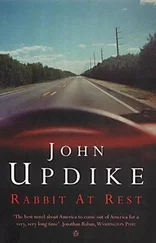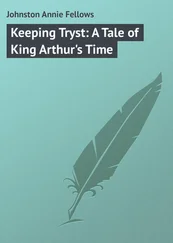"So was my father!" Ahmad exclaims, yet in exploration of the bond can only think to ask, "How do you like Mubarak?"
The smile fades. "Tool of America."
Charlie, as if joining in a game, asks, "The Saudi princes?"
"Tools."
"How about Muammar al-Qadaffi?"
"Now, too. Tool. Very sad."
Ahmad resents Charlie intruding in the conversation between what are, after all, the key players, the technician and the martyr; it is as if, his martyrdom assured, he can be brushed aside. A tool. He asserts himself, asking, "Osama bin Laden?"
"Great hero," the man with oil-blackened fingers answers. "Cannot be caught. Like Arafat. A fox." He smiles, but has not forgotten the point of this meeting. He says to Ahmad in his most careful English, "Show me what you will do."
The boy is beset by a freezing sensation, as if reality has shed a layer of its bulky disguise. He overcomes his distaste for the ugly plain truck, dispensable like him. He reaches toward the detonator, his face stretched into a question.
The stocky technician smiles and reassures him, "Is O.K. Not connected. Show me."
The small yellow lever, L-shaped in cross-section, touches his hand, it seems, rather than his hand touching it. "I turn this switch to the right"-it stiffly resists, and then sucks, as if magnetized, into its off position, ninety degrees away- "and push this button down in here down." Involuntarily he closes his eyes, feeling it sink half an inch.
"And hold down," his teacher repeats, "until-"
"Boom, " Ahmad supplies.
"Yes," the man agrees; the word hangs in the air like a mist.
"You are very brave," the younger, taller, and thinner of the two strangers says, in an English virtually accent-free.
"He is a faithful son of Islam," Charlie tells him. "We all envy him, right?" Again Ahmad feels irritation with Charlie, for acting proprietorial where he has no ownership. Only the doer owns this deed. Something preoccupied and bossy in Charlie's approach casts doubt on the absolute nature of istishhdd and the exalted, dread-filled condition of the istishhddi.
Perhaps the technician feels this slight failure of accord among the warriors, for he rests a paternal hand on Ahmad's shoulder, soiling the boy's white shirt with oily fingerprints, and explains to the others, "His way is good. To be hero for Allah."
Back in the cheerfully orange truck, Charlie confides to Ahmad, "Interesting to see their minds work. Tools, hero: no shades in between. As if Mubarak and Arafat and the Saudis don't all have tlieir special situations and their own intricate games to play."
Again, Charlie strikes a note that feels, to Ahmad in his newly elevated and simplified sense of himself, slightly false. Relativism seems cynical. "Perhaps," he offers in polite contradiction, "God Himself is simple, and employs simple men to shape the world."
"Tools," Charlie says, staring humorlessly ahead through the windshield, which Ahmad wipes every morning but which becomes dirty anyway by the end of the day. "We're all tools. God bless brainless tools-right, Madman?"
A certain simplicity does lay hold of Ahmad in the troughs between surges of terror and then of exaltation, collapsing back into an impatience to be done with it. To have it behind him, whatever "him" will then be. He exists as a close neighbor to the unimaginable. The world in its sunstruck details, the minute scintillations of its interlocked workings, yawns all about him, a glistening bowl of busy emptiness, while within him a sodden black certainty weighs. He cannot forget the transformation awaiting him, behind, as it were, the snapped camera's shutter, even as his senses still receive their familiar bombardment of sights and sounds, scents and tastes. The luster of Paradise leaks backward into his daily life. Things will feel big there, on a cosmic scale; in his childhood, only a few years into this life, falling asleep, he would experience a sensation of hugeness, every cell a world, and this demonstrated to his childish mind religion's truth.
His workload at Excellency has lightened, and he is left with stretches of idleness in which he should read the Qur'an, or study the pamphlets, readily available from overseas sources, composed and printed to prepare a shahid -the ablutions, the mental cleansing of the spirit-for his end, or her end, for women now, their loose black burqas well concealing their explosive vests, are permitted, in Palestine, the privilege of martyrdom. But his mind is too a-flutter to sink into study. His whole existence has become enraptured as perhaps the Prophet's was in accepting Gabriel's dictation of the divine suras. Ahmad's every minute has taken on the intimate doubleness of prayer, the self-release of turning aside and addressing a self not his own but that of Another, a Being as close as the vein of his neck. More than five times a day he finds the opportunity, most often in the store's barren parking lot, to spread his mat in the eastward direction and touch his forehead to the earth, each time receiving, through the concrete, the close comfort of submission. The slaglike dark weight nagging within him skews his view of die world, and bedecks each twig and telephone wire with jewels he has never before noticed.
Saturday morning, before the store has opened, he sits on a step of die loading platform, observing a black beetle struggling on his back on the concrete of the parking lot. The day is September eleventh, still summer. The early sun slants off the rough, pale surface with a mildness that holds in it the heat of the coming day as a seed not yet germinated holds in it die eventual blossom. The concrete in its cracks has permitted weeds to flourish, the tall weeds of the dying season, with their milky spittle and fine-haired leaves, wet with autumn's heavy dew. The sky above is cloudless, but for some dry shreds of cirrus and a disintegrating jet trail. Its pure blue is still somehow soft, powder-blue, from its recent immersion in darkness and stars. The beetle's tiny black legs wave in the air, groping for a purchase with which to right itself, casting sharp shadows elongated by the sun at its morning slant. The legs of the small creature wiggle and wridie in a kind of fury, then subside into a semblance of thought, as if the beetle seeks to reason a way out of its predicament. Ahmad wonders, Where did this bug come from ? How did it fall here, seeming unable to use its wings? The struggle resumes. How precise the shadows of its legs are, cast widi an all-loving fidelity by photons that have traveled ninety-three million miles to this exact spot!
Ahmad rises from his seat on the coarse plank step and stands over die insect in lordly fashion, feeling huge. Yet he shies from touching this mysterious fallen bit of life. Perhaps it has a poisonous bite, or, like some miniature emissary from Hell, it will fasten onto his finger and never let go. Many a boy-Tylenol, for one-would simply crush this irritating presence with his foot, but for Ahmad die option does not exist: it would produce a broadened corpse, a squashed tangle of tiny parts and spilled vital fluid, and he does not wish to contemplate any such organic horror. He looks around him briefly for a tool, for something stiff with which to flip the insect over-the dark little cardboard, for instance, used to give die two parts of a Mounds bar integrity, or to reinforce a double Reese's Peanut Butter Cup-but he sees nothing suitable. Excellency Home Furnishings tries to keep its private lot litter-free. The African-American "muscle" and Ahmad himself have been sent out into it with a green garbage bag, on clean-up duty. He spots no happenstance spatula lying loose but, on a sudden inspiration, remembers the driver's license in his wallet, a plastic rectangle in which a scowling and unflattering image of himself is embedded with some numerical data important to the state of New Jersey and a hologrammatical, counterfeit-repellent image of its Great Seal. With this, he manages, after a few tentative, squeamish attempts, to flip the tiny creature at his mercy over onto its legs. Sunlight strikes sparks of iridescence, purple and green, from the biform shell of folded wings. Ahmad goes back to his porch on the step to enjoy the good results of his rescue, his merciful intervention in the natural order. Fly away, fly away.
Читать дальше












